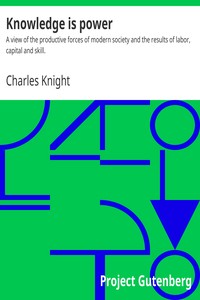Knowledge is power : A view of the productive forces of modern society and the…
"Knowledge Is Power" by Charles Knight is a philosophical exploration of the economic forces that shape modern society, written in the mid-19th century. The work discusses the interrelation of labor, capital, and skill, emphasizing how knowledge, particularly scientific knowledge, empowers individuals and society as a whole. It intends to convey these aspects in an accessible manner, aiming especially to educate the youth about the foundations of political economy. The opening of the
book introduces the idea that human beings, unlike other animals, face unique challenges due to their extensive needs and apparent lack of natural means for survival. Knight uses a hypothetical scenario to explore the dire state of a civilized man stranded in a desert, devoid of resources or tools, illustrating the essential role of accumulated knowledge and labor. He contrasts this scenario with that of the Moskito Indian who survives due to his understanding of natural resources, demonstrating the importance of prior accumulation of knowledge and tools as a foundation for productive labor. Through these examples, Knight sets the stage for a broader discussion on the principles governing wealth production and the necessity of education for social progress. (This is an automatically generated summary.)
Read or download for free
| Reading Options | Url | Size | |||
|---|---|---|---|---|---|
| Read now! | https://www.gutenberg.org/ebooks/38367.html.images | 884 kB | |||
| EPUB3 (E-readers incl. Send-to-Kindle) | https://www.gutenberg.org/ebooks/38367.epub3.images | 7.1 MB | |||
| EPUB (older E-readers) | https://www.gutenberg.org/ebooks/38367.epub.images | 7.1 MB | |||
| EPUB (no images, older E-readers) | https://www.gutenberg.org/ebooks/38367.epub.noimages | 401 kB | |||
| Kindle | https://www.gutenberg.org/ebooks/38367.kf8.images | 11.2 MB | |||
| older Kindles | https://www.gutenberg.org/ebooks/38367.kindle.images | 11.2 MB | |||
| Plain Text UTF-8 | https://www.gutenberg.org/ebooks/38367.txt.utf-8 | 798 kB | |||
| Download HTML (zip) | https://www.gutenberg.org/cache/epub/38367/pg38367-h.zip | 7.0 MB | |||
| There may be more files related to this item. | |||||
Similar Books
About this eBook
| Author | Knight, Charles, 1791-1873 |
|---|---|
| Title | Knowledge is power : A view of the productive forces of modern society and the results of labor, capital and skill. |
| Credits |
Produced by Pat McCoy, Odessa Paige Turner and the Online Distributed Proofreading Team at www.pgdp.net (This file was produced from images generously made available by The Internet Archive/Canadian Libraries) |
| Reading Level | Reading ease score: 52.7 (10th to 12th grade). Somewhat difficult to read. |
| Language | English |
| LoC Class | T: Technology |
| Subject | Industrial arts |
| Subject | Industries |
| Category | Text |
| EBook-No. | 38367 |
| Release Date | Dec 22, 2011 |
| Copyright Status | Public domain in the USA. |
| Downloads | 826 downloads in the last 30 days. |
| Project Gutenberg eBooks are always free! | |

